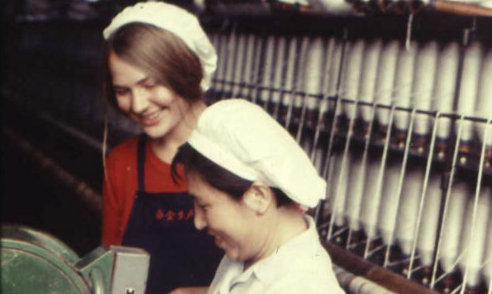
Born in 1949, the year when New China was founded, Isabel Hilton, a Scottish writer, columnist, broadcaster and documentary producer, saw her life become closely intertwined with China over the past 40 years.
It all started when she lived here for two years back in the early 1970s when the country was in the middle of its own internal upheaval. Hilton, then a young Sinology major student from the graduate school of Edinburgh University, was one of the first 12 British students who came to China to study after the start of the Cultural Revolution (1966-76).
Today, as a graceful lady in her 60s, Hilton still remembers vividly the scene of Beijing she laid eyes on when she first set foot in China in October 1973. "It was puzzling, it felt like another world, remote and enclosed," Hilton wrote in her own memoir. But it is the very feeling of "strange" and "uneasy" that perhaps best describes her early life in Beijing as soon as she started her Chinese studies at the Beijing Language and Culture University. "The campus was very empty and there was almost nobody there… I was never able to go out on the street without a crowd gathering to stare at me, as people were astonished to find a foreigner loose on the street," said Hilton in a phone interview with the Global Times from her London home.
Toiling in factories
Hoping to come to China to study Chinese literature, Hilton later found this to be impossible as most of the 20th century Chinese literature she wanted to study was banned during the Cultural Revolution, including the works by her favorite writer Lao She, the famous Chinese writer who took his own life in 1966 following repeated persecution. "I dreamed of reading his Beijing stories in the city that had been his own inspiration, mastering the mysteries of the Beijing vernacular that he loved," Hilton's memoir reads. "It was indeed very frustrating that in the classroom, we could only discuss poetry by Chairman Mao…and the only entertainment was to watch a handful of Jiang Qing's model operas."
Tired of the "mind-numbingly" boring classes in which politics were the most important factor in evaluating a student's academic performance, Hilton and her fellow classmates, proposed leaving the campus and, at least for a while, work in farms, factories and communes as other Chinese students did. Despite back-breaking labor, Hilton says she felt fortunate to have the experience of working in a biscuit factory assembly line or cotton-spinning in a cotton factory. "It was great and interesting, as it offered me a chance to get to know a lot of ordinary people. Otherwise, it would be very difficult and you got to see what working conditions were like, and gain much better sense of what it's like to work in factories," said Hilton.





Why not rent a boyfriend, or girlfriend to please parents during the Spring Festival?